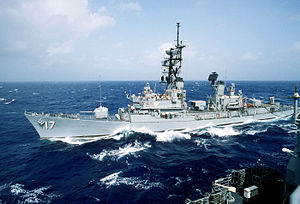- USS Conyngham (DDG-17)
-
For other ships of the same name, see USS Conyngham.

USS Conyngham (DDG-17)Career (US) 
Name: Conyngham (DDG-17) Namesake: Gustavus Conyngham Ordered: 21 July 1959 Builder: New York Shipbuilding Corporation, Camden, New Jersey Laid down: 1 May 1961 Launched: 18 May 1962 Acquired: 1 July 1963 Commissioned: 13 July 1963 Decommissioned: 30 October 1990 Struck: 30 May 1991 Fate: sold for scrap, 15 April 1994 General characteristics Class and type: Charles F. Adams-class destroyer Displacement: 3,277 tons standard, 4,526 full load Length: 437 ft (133 m) Beam: 47 ft (14 m) Draft: 15 ft (4.6 m) Propulsion: 2 × General Electric steam turbines providing 70,000 shp (52 MW); 2 shafts
4 x Combustion Engineering 1,275 psi (8,790 kPa) boilersSpeed: 33 knots (61 km/h) Range: 4,500 nautical miles (8,300 km) at 20 knots (37 km/h) Complement: 354 (24 officers, 330 enlisted) Sensors and
processing systems:AN/SPS-39 3D air search radar
AN/SPS-10 surface search radar
AN/SPG-51 missile fire control radar
AN/SPG-53 gunfire control radar
AN/SQS-23 Sonar and the hull mounted SQQ-23 Pair Sonar for DDG-2 through 19
AN/SPS-40 Air Search RadarArmament: 1 Mark 11 launcher (DDG2-14) or Mark 13 single arm launcher (DDG-15-24) for Tartar SAM system or later the Standard SM-1 and Harpoon antiship missile
2x Mark 42 5in(127mm)/54
1x ASROC Launcher
6x 12.8in(324mm) ASW Torpedo Tubes (2xMark 32 Surface Vessel Torpedo Tubes)Aircraft carried: None Motto: Ready to Serve USS Conyngham (DDG-17), the third ship named for Captain Gustavus Conyngham USN (1744–1819), was a Charles F. Adams-class guided missile armed destroyer in the United States Navy.
Conyngham was laid down by the New York Shipbuilding Corporation at Camden in New Jersey on 1 May 1961, launched on 19 May 1962 by Mrs. Carl B. Albert, wife of Representative Albert of Oklahoma, House Majority Leader and commissioned on 13 June 1963, Commander Edwin P. Smith in command.
The USS Conyngham, nicknamed The Gus Boat, was unique in that it was one of two naval warships with shamrocks on her stacks (the other being the USS Coral Sea (CV-43).[citation needed] During her 27 years of commissioned service, Conyngham lived up to her motto, Ready to Serve. Her presence exerted a powerful influence during times of crisis and helped maintain peace as a component of NATO seapower throughout the Cold War period. Conyngham made 15 Mediterranean deployments—three to the Persian Gulf, seven to Northern Europe, and 11 deployments to the Caribbean. She distinguished herself during crises in Cyprus (1964, 1974); provided air cover for planes evacuating Americans from an insurrection in Amman, Jordan (1970); took part in contingency operations during the Arab-Israeli Yom-Kippur War (1973); was the escort combatant during the evacuation of Americans from Beirut, Lebanon (1976); and conducted Black Sea Freedom of Navigation operations (1979).
During the 1980s, Conyngham continued to support United States foreign policy when she served off the coast of Libya (1982); was awarded the Navy Expeditionary Medal for providing naval gunfire support of Marines stationed in, and off the coast of, Beirut, Lebanon (1983) and monitored maritime traffic off the coast of Nicaragua (1983). She sailed with the USS America (CV-66) Baffle Group in support of U. S. intervention forces in Grenada (1983). While deployed to the Caribbean in 1986, Conyngham was credited with four drug interdictions and was awarded the Coast Guard Meritorious Unit Commendation Medal.
Conyngham continued superior performance as she escorted U. S. Flagged merchant shipping through the Persian Gulf during the Iran-Iraq War in 1987 in Operation Earnest Will. During that deployment she sortied from Bahrain on short notice and provided assistance to USS Stark (FFG-31) after she was hit by two anti-ship missiles launched by an Iraqi F-1 Mirage. Conyngham was awarded the Navy Unit Commendation for her efforts in saving the crippled ship. In 1988, Conyngham continue the Gus Can Do tradition during her deployments to the Fjords of Norway and Northern Europe. She completed her fifteenth Mediterranean deployment and received her fourth Battle Efficiency "E" in 1989 while part of the USS Theodore Roosevelt (CVN-71) battlegroup.
Mainspace fire
Conyngham suffered a severe fire on 8 May 1990, while conducting pre-deployment operations off the Virginia coast. A major fuel oil fire erupted from the ship's Forward Fire Room into the ship's superstructure, isolating the crew forward and aft. requiring an all-hands effort to extinguish it. During the mass conflagration, the Operations Officer (LCDR A. Pope Gordon, Jr.)was killed and 18 other sailors were injured, some of them severely while putting out the uncontrollable fire.[citation needed]
USS Conyngham was decommissioned on 20 October 1990, stricken from the Naval Vessel Register on 31 May 1991 and sold for scrap on 15 April 1994.
References
- This article includes information collected from the Naval Vessel Register, which, as a U.S. government publication, is in the public domain. The entry can be found here.
External links
- MaritimeQuest USS Conyngham DDG-17 pages
- USN damage control museum - 8 May 1990 Class Bravo Fire in the #1 Fire Room
 United States Navy
United States NavyCharles F. Adams · John King · Lawrence · Biddle ⁄ Claude V. Rickets · Barney · Henry B. Wilson · Lynde McCormick · Towers · Sampson · Sellers · Robison · Hoel · Buchanan · Berkeley · Joseph Strauss · Conyngham · Semmes · Tattnall · Goldsborough · Cochrane · Benjamin Stoddert · Richard E. Byrd · Waddell
 German Navy
German Navy
Lütjens class Royal Australian Navy
Royal Australian Navy
Perth class Hellenic Navy
Hellenic Navy
List of destroyers of the United States Navy · List of destroyer classes of the United States NavyCategories:- Cold War destroyers of the United States
- 1962 ships
- Charles F. Adams class destroyers of the United States Navy
Wikimedia Foundation. 2010.
